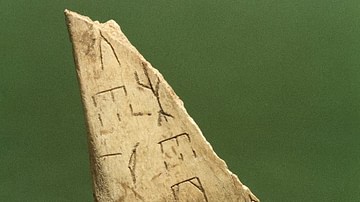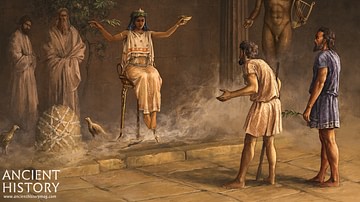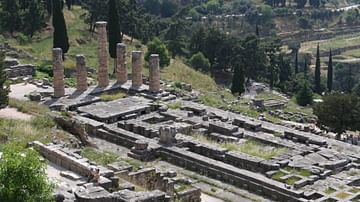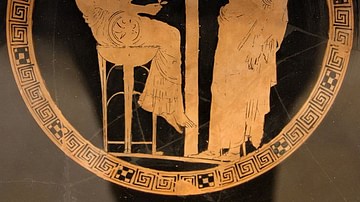Search
Remove Ads
Advertisement
Search Results

Definition
Oracle Bones
Oracle Bones (also known as Dragon's Bones) were the shoulder blades of oxen or plastrons of turtles (the flat underside of the turtle's shell) which were used in the Shang Dynasty of China (c. 1600-1046 BCE) for divination. The symbols carved...

Definition
Delphi
Delphi was an important ancient Greek religious sanctuary sacred to the god Apollo. Located on Mt. Parnassus near the Gulf of Corinth, it was home to the famous oracle of Apollo which gave cryptic predictions and guidance to both city-states...

Image
Pythia of the Oracle of Delphi
"Priestess of Delphi" by John Collier, 1891.
A 19th century vision of how the Pythia might have looked like, and how she became intoxicated by hallucinogenic gases emerging from the floor.

Image
The Oracle at Delphi (Artist's Impression)
Two Greek nobles consult with the Oracle at Delphi before setting out to establish a new colony abroad. Art by Mateusz Przeklasa.

Article
The Pythia – Priestess of Ancient Delphi
The imposing archaeological site of Delphi sits over 1800 feet up on the south-western spur of Mount Parnassus, about 6 miles inland from the Corinthian Gulf, central Greece. The ancient temple complex of Delphi, which dates back at least...

Definition
Croesus
Croesus (r. 560-546 BCE) was the King of Lydia, a region in western Asia Minor (modern-day Turkey) and was so wealthy that the expression "as rich as Croesus" originates in reference to him. Best known for his wealth, he is also famous for...

Image
Aegeus Consults the Oracle at Delphi
Themis and Aegeus. Attic red-figure kylix, from Vulci, 440-430 BCE.
Antikensammlung, Altes Museum, Berlin, Germany.

Definition
Amphictyonic League
The Amphictyonic League was an early form of religious council in ancient Greece. It was typically composed of delegates from several tribes or ethnes living in the vicinity of a major, prosperous sanctuary, who then collaborated in supervising...

Definition
Lycurgus
Lycurgus is considered the semi-mythical founder of classical Sparta and responsible for all of the city-state’s laws as well as its military and political institutions. He became better known to generations of Spartans as the lawgiver. He...

Definition
Socrates
Socrates of Athens (l. c. 470/469-399 BCE) is among the most famous figures in world history for his contributions to the development of ancient Greek philosophy which provided the foundation for all of Western Philosophy. He is, in fact...